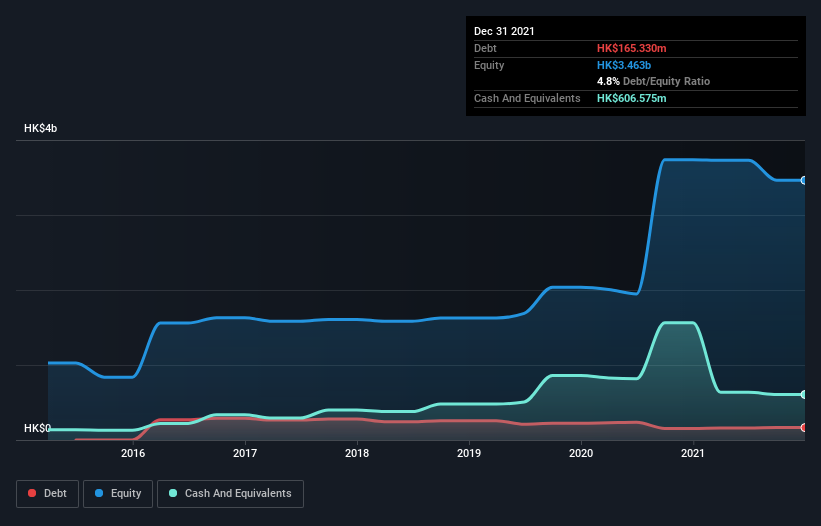
Legendary fund manager Li Lu (who Charlie Munger backed) once said, 'The biggest investment risk is not the volatility of prices, but whether you will suffer a permanent loss of capital.' So it might be obvious that you need to consider debt, when you think about how risky any given stock is, because too much debt can sink a company. We note that Summit Ascent Holdings Limited (HKG:102) does have debt on its balance sheet. But is this debt a concern to shareholders?
When Is Debt Dangerous?
Debt assists a business until the business has trouble paying it off, either with new capital or with free cash flow. In the worst case scenario, a company can go bankrupt if it cannot pay its creditors. However, a more frequent (but still costly) occurrence is where a company must issue shares at bargain-basement prices, permanently diluting shareholders, just to shore up its balance sheet. Of course, plenty of companies use debt to fund growth, without any negative consequences. When we think about a company's use of debt, we first look at cash and debt together.
Check out our latest analysis for Summit Ascent Holdings
What Is Summit Ascent Holdings's Net Debt?
As you can see below, at the end of December 2021, Summit Ascent Holdings had HK$165.3m of debt, up from HK$155.0m a year ago. Click the image for more detail. But on the other hand it also has HK$606.6m in cash, leading to a HK$441.2m net cash position.

How Strong Is Summit Ascent Holdings' Balance Sheet?
The latest balance sheet data shows that Summit Ascent Holdings had liabilities of HK$64.3m due within a year, and liabilities of HK$195.2m falling due after that. Offsetting these obligations, it had cash of HK$606.6m as well as receivables valued at HK$1.08b due within 12 months. So it can boast HK$1.43b more liquid assets than total liabilities.
This surplus liquidity suggests that Summit Ascent Holdings' balance sheet could take a hit just as well as Homer Simpson's head can take a punch. Having regard to this fact, we think its balance sheet is as strong as an ox. Succinctly put, Summit Ascent Holdings boasts net cash, so it's fair to say it does not have a heavy debt load! The balance sheet is clearly the area to focus on when you are analysing debt. But you can't view debt in total isolation; since Summit Ascent Holdings will need earnings to service that debt. So when considering debt, it's definitely worth looking at the earnings trend. Click here for an interactive snapshot.
Over 12 months, Summit Ascent Holdings reported revenue of HK$226m, which is a gain of 6.9%, although it did not report any earnings before interest and tax. We usually like to see faster growth from unprofitable companies, but each to their own.
So How Risky Is Summit Ascent Holdings?
While Summit Ascent Holdings lost money on an earnings before interest and tax (EBIT) level, it actually generated positive free cash flow HK$20m. So taking that on face value, and considering the net cash situation, we don't think that the stock is too risky in the near term. There's no doubt the next few years will be crucial to how the business matures. When analysing debt levels, the balance sheet is the obvious place to start. But ultimately, every company can contain risks that exist outside of the balance sheet. For example, we've discovered 3 warning signs for Summit Ascent Holdings (1 doesn't sit too well with us!) that you should be aware of before investing here.
When all is said and done, sometimes its easier to focus on companies that don't even need debt. Readers can access a list of growth stocks with zero net debt 100% free, right now.
New: Manage All Your Stock Portfolios in One Place
We've created the ultimate portfolio companion for stock investors, and it's free.
• Connect an unlimited number of Portfolios and see your total in one currency
• Be alerted to new Warning Signs or Risks via email or mobile
• Track the Fair Value of your stocks
Have feedback on this article? Concerned about the content? Get in touch with us directly. Alternatively, email editorial-team (at) simplywallst.com.
This article by Simply Wall St is general in nature. We provide commentary based on historical data and analyst forecasts only using an unbiased methodology and our articles are not intended to be financial advice. It does not constitute a recommendation to buy or sell any stock, and does not take account of your objectives, or your financial situation. We aim to bring you long-term focused analysis driven by fundamental data. Note that our analysis may not factor in the latest price-sensitive company announcements or qualitative material. Simply Wall St has no position in any stocks mentioned.
About SEHK:102
Summit Ascent Holdings
Summit Ascent Holdings Limited, an investment holding company, engages in the operation of hotel and gaming business.
Adequate balance sheet and fair value.
Market Insights
Community Narratives





